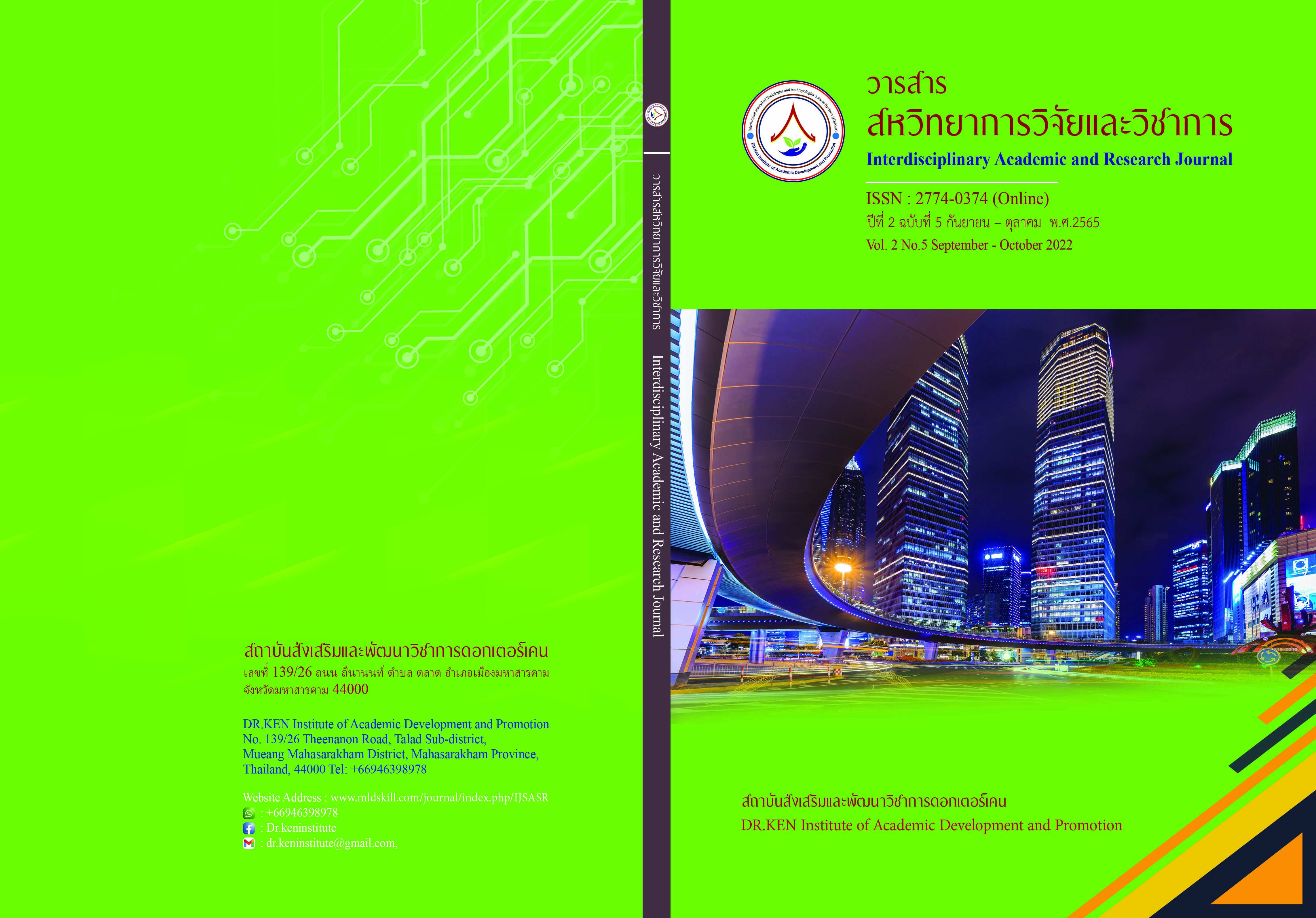The Development Model of the Excellence School Management Based Philosophy of Sufficiency Economy, Ban Pongpuey School, Bueng Kan Primary Education Area Office
DOI:
https://doi.org/10.14456/iarj.2022.9ึ7Keywords:
Development; , Excellence School Management; , Philosophy of Sufficiency EconomyAbstract
In this research, the researcher surveyed the need for institutional management from the meeting of stakeholders, so it was concluded that learners can learn in a variety of ways according to their interests and potential. and would like the school to have quality and excellence in accordance with the philosophy of sufficiency economy. The researcher, as a school administrator, therefore invited all stakeholders to attend the meeting in order to use the research results as a guideline for further development of educational management. This research aims to: (1) Study the state of educational institution management towards excellence in accordance with the philosophy of sufficiency economy. (2) Create and develop a model for the development of educational institution management towards excellence in accordance with the philosophy of sufficiency economy. (3) Experimental model of educational institution management development towards excellence in accordance with the philosophy of sufficiency economy. And (4) to study the satisfaction of those involved in the performance according to the model of educational institution management development towards excellence according to the philosophy of sufficiency economy. This study was conducted at Ban Pong Pue School under the Bueng Kan Primary Educational Service Area Office using Mixed Methods Research. The sample group used in this research consisted of 50 schools which are educational opportunity extension schools under the Bueng Kan Primary Educational Service Area Office, 50 schools, There are 300 informants. The tools used for data collection were Document Analysis, Unstructured Interview, and Opinion Questionnaire. The statistics used to analyze the data are frequency, percentage, mean, standard deviation. Reference statistics include Confirmatory Factor Analysis using statistical software packages. And analyze the qualitative data with Content analysis and Analytic inductive.The results showed that: (1) The state of educational institution management towards excellence in accordance with the Sufficiency Economy Philosophy found that there were seven relevant components in management, namely: Strategic Leadership, focusing on personnel development, curriculum and teaching and learning management, student development activities, measurement, analysis and knowledge management, stakeholder-focused students, and operational results. There are three systemic components of a model: (a) input factors, (b) process factors, and (b) output factors. (2) The model for the development of educational institution management towards excellence in accordance with the philosophy of sufficiency economy consists of 3 main components as follows; (a) Input has two sub-components: (1.1) Strategic Leadership, (1.2) Focus on Personnel Development. (b) The process has 4 sub-components: (2.1) Curriculum and Instructional Management, (2.2) Student Development Activities, (2.3) Measurement Analysis and Knowledge Management, (2.4) Student Focus. stakeholders, (c) Output has one subcomponent, which is the result of the operation. (3) The results of the experimental use of the model for improving the management of educational institutions towards excellence according to the philosophy of sufficiency economy showed that schools had higher performance developed according to 6 strategies, and students have higher academic achievement. (4) Satisfaction of those involved in the performance according to the model of educational institution management development towards excellence according to the philosophy of sufficiency economy, That is to say, both administrators, teachers, basic education committees, students, and parents were satisfied at the highest level.
References
กระทรวงศึกษาธิการ. (2558). ยุทธศาสตร์การขับเคลื่อนปรัชญาเศรษฐกิจพอเพียงสู่สถานศึกษา (2553-2557) ศูนย์ประสานงานกลางการดำเนินการโครงการอันเนื่องมาจากพระราชดำริ.สำนักพัฒนา กิจการนักเรียนนักศึกษาและกิจการพิเศษ. กรุงเทพมหานคร : สำนักปลัดกระทรวง.
กัลลิกา ศรีหาสาร. (2561). รูปแบบการบริหารสถานศึกษาพอเพียงสังกัดส านักงานคณะกรรมการการศึกษาขั้นพื้นฐานสู่สถานศึกษาพอเพียงที่มีผลการปฏิบัติที่เป็นเลิศ. วารสารวิชาการมหาวิทยาลัยการจัดการและเทคโนโลยีอีสเทิร์น. 15(2), 237-248.
คำตัน จันทะวงษา. (2559). การบริหารจัดการสถานศึกษาตามหลักปรัชญาของเศรษฐกิจพอเพียงสังกัดสำนักงานเขตพื้นที่การศึกษาประถมศึกษาจังหวัดปทุมธานีเขต 2 .(วิทยานิพนธ์ปริญญามหาบัณฑิต). ปทุมธานี: มหาวิทยาลัยราชภัฏวไลยอลงกรณ์ในพระบรมราชูปถัมภ์.
จงรักษ์ ศรีทิพย์. (2560). การพัฒนารูปแบบการบริหารจัดการสู่ความเป็นเลิศของโรงเรียนอนุบาลประจำจังหวัด. วารสารศิลปากรศึกษาศาสตร์วิจัย. 9(1), 201-215.
จุฑามาส พัฒนศิริ. (2560). แนวทางการบริหารสถานศึกษาตามหลักปรัชญาของเศรษฐกิจพอเพียงของโรงเรียนในจังหวัดนครสวรรค์สังกัดสํานักงานเขตพื้นที่การศึกษามัธยมศึกษา เขต42. (วิทยานิพนธ์ปริญญาครุศาสตรมหาบัณฑิต สาขาวิชาการบริหารการศึกษา). มหาวิทยาลัยราชภัฏนครสวรรค์.
ชนากานต์ กาหลง. (2560). สภาพและแนวทางการพัฒนาการบริหารสถานศึกษาตามหลักปรัชญาของเศรษฐกิจพอเพียงของสถานศึกษาสังกัดสำนักงานเขตพื้นที่การศึกษาประถมศึกษามหาสารคามเขต 2 (วิทยานิพนธ์ปริญญามหาบัณฑิต). มหาสารคาม: มหาวิทยาลัยราชภัฏมหาสารคาม.
ชัยวัฒน์ ธีระกุลพิศุทธ (2564). การบริหารสถานศึกษาตามหลักปรัชญาของเศรษฐกิจพอเพียงในโรงเรียนกลุ่มกรุงเทพกลางสังกัดกรุงเทพมหานคร. สาขาวิชาการบริหารการศึกษา คณะวิทยาลัยการฝึกหัดครูมหาวิทยาลัยราชภัฏพระนคร
ณัฐมนต์ ชาญเชิงค้า. (2561). รูปแบบการบริหารสถานศึกษาสู่ความเป็นเลศของโรงเรียนขยายโอกาส สังกัดสำนักงานคณะกรรมการการศึกษาขั้นพื้นฐาน. วารสารมนุษยศาสตร์และสังคมศาสตร์ (สทมส.). 24 (3),87-101.
นัฐฐยา พิพัฒน์นราธร และนิษฐ์วดี จิรโรจน์ภิญโญ. (2561). การบริหารจัดการสู่ความเป็นเลิศของโรงเรียนเอกชนในกรุงเทพมหานคร. วารสารบัณฑิตศึกษามหาจุฬาขอนแก่น. 5(1), 223-240.
พัชรินทร์ โคตรสมบัติ. (2558). การพัฒนาแนวทางการบริหารงานวิชาการแบบมีส่วนร่วมสำหรับสถานศึกษาขนาดเล็ก สังกัดสำนักงานเขตพื้นที่การศึกษามัธยมศึกษา เขต 25. วารสารมหาจุฬานาครทรรศน์. 7(8), 190-203.
พุทธิภา เหล็กคงสันเทียะ. (2564). รูปแบบการบริหารสู่ความเป็นเลิศของสถานศึกษา สังกัดสำนักงานเขตพื้นที่การศึกษามัธยมศึกษา เขต 31. วารสารวิชาการ สถาบันเทคโนโลยีแห่งสุวรรณภูมิ. 7(1),205-223.
มังโสด หมะเต๊ะ. (2562). การบริหารคุณภาพการศึกษาสู่ความเป็นเลิศของโรงเรียนขนาดเล็กในเขตพื้นที่การศึกษาประถมศึกษาสงขลา เขต 3. วารสารราชนครินทร์. 16 (36), 89-100.
ราตรี ศรีไพรวรรณ (2556). การพัฒนากลยุทธ์การบริหารสู่ความเป็นเลิศของโรงเรียนมาตรฐานสากลระดับประถมศึกษา. คณะครุศาสตร์: จุฬาลงกรณ์มหาวิทยาลัย.
วีระ บัวผัน. (2564). รูปแบบการพัฒนาวัฒนธรรมองค์การสู่ความเป็นเลิศของสถานศึกษา สังกัดสำนักงานเขตพื้นที่การศึกษาประถมศึกษากำแพงเพชร เขต 1. วารสารสังคมศาสตร์และมานุษยวิทยาเชิงพุทธ. 6(1), 145-161.
ศูนย์สถานศึกษาพอเพียง มูลนิธิยุวสถิรคุณ. (2560). คู่มือวิทยากรในการฝึกอบรมเชิงปฏิบัติการการจัดการเรียนรู้เพื่อเสริมสร้างคุณลักษณะอยู่อย่างพอเพียง Version3.3. กรุงเทพฯ :ศูนย์สถานศึกษาพอเพียง มูลนิธิยุวสถิรคุณ.
สกาวเดือน ควันไชย. (2560). สภาพและแนวทางการบริหารจัดการตามหลักปรัชญาของเศรษฐกิจพอเพียงของสถานศึกษาสังกัดสำนักงานเขตพื้นที่การศึกษามัธยมศึกษาเขต 19. (วิทยานิพนธ์ปริญญามหาบัณฑิต). มหาสารคาม: มหาวิทยาลัยราชภัฏมหาสารคาม.
สภาขับเคลื่อนการปฏิรูปประเทศด้านการศึกษา. (2559). รายงานของคณะกรรมาธิการขับเคลื่อนการปฏิรูปประเทศด้านการศึกษา สภาขับเคลื่อนการปฏิรูปประเทศ เรื่อง "แผนปฏิรูปเร่งด่วนในการแก้ไขปัญหาเกี่ยวกับการประกันคุณภาพการศึกษาภายใน และการประเมินคุณภาพการศึกษาภายนอก. กรุงเทพฯ : สำนักงานสภาขับเคลื่อนการปฏิรูปประเทศด้านการศึกษา.
สมกิต บุญยะโพธิ์. (2557). รูปแบบการบริหารสถานศึกษาขั้นพื้นฐานสังกัดสำนักงานเขตพื้นที่การศึกษาประถมศึกษาสู่ความเป็นเลิศ. วารสารศิลปากรศึกษาศาสตรวิจัย. 6(2), 80-95.
สมศักดิ์ศรี ชราศรี. (2562). การพัฒนารูปแบบการบริหารจัดการสถานศึกษาขนาดเล็กตามหลักปรัชญาของเศรษฐกิจพอเพียง. วารสารสถาบันวิจัยและพัฒนา มหาวิทยาลัยราชภัฏมหาสารคาม. 6(1), 203-222.
สำนักงานคณะกรรมการการศึกษาขั้นพื้นฐาน กระทรวงศึกษาธิการ. (2559). คู่มือบริหารจัดการเวลา เรียน“ลดเวลาเรียน เพิ่มเวลารู้” ปีการศึกษา 2559. กรุงเทพฯ : สำนักงานคณะกรรมการการศึกษาขั้น พื้นฐาน.
สำนักงานคณะกรรมการการศึกษาขั้นพื้นฐาน. (2553). พระราชบัญญัติการศึกษาแห่งชาติพ.ศ.2542 และที่แก้ไข. เพิ่มเติม (ฉบับที่ 3) พ.ศ.2553. กรุงเทพฯ : สำนักนายกรัฐมนตรี.
สำนักงานคณะกรรมการพัฒนาการเศรษฐกิจและสังคมแห่งชาติ. (2559). เอกสารประกอบการระดมความคิดเห็นแผนพัฒนาเศรษฐกิจและสังคมแห่งชาติฉบับที่12 (พ.ศ. 2560-2564). สำนักงานคณะกรรมการพัฒนาการเศรษฐกิจและสังคมแห่งชาติ.
สำนักงานเลขาธิการสภาการศึกษา. (2557). รายงานการวิจัยแนวทางการพัฒนาการศึกษาไทยกับการเตรียม ความพรอมศตวรรษที่ 21. กรุงเทพฯ : สำนักงานเลขาธิการสภาการศึกษา.
สำนักงานเลขาธิการสภาการศึกษา. (2560). แผนการศึกษาแหงชาติ พ.ศ.2560 - 2579. กรุงเทพฯ : สำนักงานเลขาธิการสภาการศึกษา กระทรวงศึกษาธิการ.
สุชาติ ผู้มีทรัพย์. (2556). รูปแบบการพัฒนาครูผู้สอนระดับการศึกษาขั้นพื้นฐาน สำหรับสถานศึกษานอกเขตชุมชนเมือง สังกัดสำนักงานเขตพื้นที่การศึกษาประถมศึกษากำแพงเพชร เขต 1 และ 2. ดุษฎีนิพนธ์ปรัชญาดุษฎีบัณฑิต สาขายุทธศาสตร์การบริหารและการพัฒนา. มหาวิทยาลัยราชภัฏกำแพงเพชร.
สุพรรษา กรอกสำโรง. (2563). ผลลัพธ์ที่พึงประสงค์ของโรงเรียนขยายโอกาสทางการศึกษาในจังหวัดระนอง. วารสารสถาบันวิจัยญาณสังวร. 11(1), 32-40.
อร่าม วัฒนะ. (2561). รูปแบบการบริหารสถานศึกษาสู่ความเป็นเลิศของโรงเรียนสังกัดองค์การบริหารส่วนจังหวัด. วารสารมหาจุฬาวิชาการ. 7(1), 55-71.
Bardo, J. W. & Hartman, J. J. (1982). Urban sociology: A systematic Introduction. New York: F. E. Peacock.
Downloads
Published
How to Cite
Issue
Section
License
Copyright (c) 2022 Tapin Setthabodee

This work is licensed under a Creative Commons Attribution-NonCommercial-NoDerivatives 4.0 International License.
Copyright on any article in the Interdisciplinary Academic and Research Journal is retained by the author(s) under the under the Creative Commons Attribution-NonCommercial-NoDerivatives 4.0 International License. Permission to use text, content, images, etc. of publication. Any user to read, download, copy, distribute, print, search, or link to the full texts of articles, crawl them for indexing, pass them as data to software, or use them for any other lawful purpose. But do not use it for commercial use or with the intent to benefit any business.
















.png)


